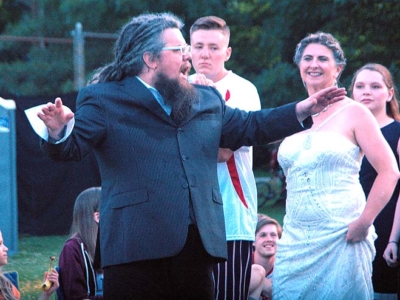Articles About AFRICAN AMERICANS IN YELLOW SPRINGS
-
Encyclopedia highlights Black lives

A “labor of love” — as well as a labor of memory, representation and community — hit a significant milestone in February with the completion and release of the first physical edition of “Blacks in Yellow Springs: A Community Encyclopedia.”
-
Assessing the value of diversity

For Jewell Graham, the 1950s, ’60s and ’70s were exhilarating times to live in the village. Having come to Yellow Springs as a young African-American woman with her new husband, Paul, who after graduating from Antioch had been offered a job at Vernay Laboratories, Graham was impressed with the quality of relationships between blacks and whites. Many businesses were integrated in a way unusual for the time, and a passion for the civil rights movement further brought people together. There was considerable socializing between blacks and whites in her world, as well as a sense of shared purpose.
-
Do housing costs affect diversity?

If local diversity can be measured by the number of African Americans who live within the geographical boundaries of Yellow Springs, the village has experienced three decades of decreasing diversity, and is likely wrapping up a fourth. Since 1970, the village has lost about 500 African-American residents, mirroring a larger regional trend.
-
Diversity decline linked to fewer jobs

If Yellow Springs has lost a significant number of jobs in the past 15 years, it follows that villagers have lost employment opportunities, which has a visible effect on an already minority African-American population. There are fewer African Americans employed in the village now than there were 30 years ago, and though there have never been a lot of African Americans who own and operate businesses in town, the current number appears to be lower than ever.
-
Village youth say race is still an issue

Yellow Springs can be a supportive town for black youth to grow up in, according to a group of 10 current Yellow Springs High School students and recent graduates in recent interviews. But the village is not immune to the issues that tend to divide the community by color and burden some African-American families disproportionately. Instances of discrimination are very subtle, and can be unintentional, but they do occur here, the youth said, and they pose obstacles both of perception and in actual practice that young people of color are challenged to overcome.
-
Achievement gap complex, but true

When Joyce McCurdy accepted a teaching position in the Yellow Springs School District, there was a black chief of police, a black member of Council, and a black member of school board. The principal of the high school was black, and three of McCurdy’s colleagues were also black — and actively involved in the social issues of the day. The year was 1965.
-
Diversity gap creates social divide

When Isabel Newman graduated from Bryan High School in 1943, Antioch Bookplate President Ernest Morgan hired her to work for the company. Soon after, he sent her to a six-week course at the Mergenthaler linotype school in New York, and upon her return, she worked for the company for over 40 years, retiring as a manager. At that company, whose president actively promoted racial integration, she recalled that typically a fourth of the employees were minorities. The support for a racially diverse staff appeared to be the same at Vernay Laboratories, where two of Newman’s sisters worked, Yellow Springs Instruments and Antioch College, the place that bred all three companies and their socially minded leaders.
-
A history of racial diversity

When Robert Harris graduated from college with a degree in physics and math, he sought an engineering job in his hometown of Philadelphia. But the year was 1952, and companies weren’t hiring blacks for professional positions.











Recent Comments